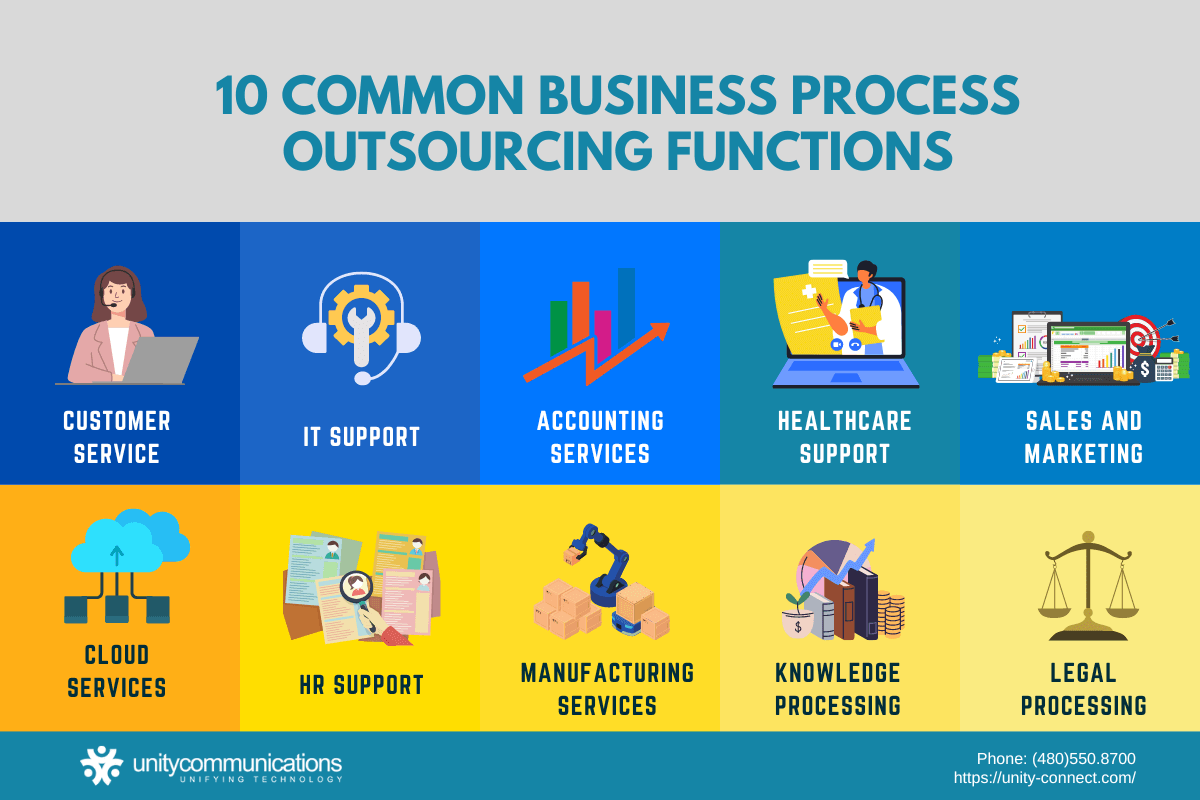IN THIS ARTICLE
Written by Joyce Ann Danieles
Contents
Multiple market studies show how comprehensive business process outsourcing (BPO) is. Each report and industry growth statistic note the advantages of collaborating with a service provider. But do you understand the functions of BPO and what the business strategy entails?
Do you know how acquiring such services helps escalate your expansion? How about the factors to consider before outsourcing or the steps to ensure a thriving BPO partnership?
Scroll down to learn more about how BPO can lead to business success if done correctly.
10 Essential Functions of BPO

Hiring a third party to do a simple task is the answer that often comes to mind when asked, “What is BPO?”
But choosing the tasks you will entrust to a provider is more complex. Every front- and back-office function consists of repetitive, tedious processes. Third-party providers also offer these services at varying prices and scopes. A failed investment is possible if you ignore the differences between the types of BPO services when planning.
Fret not! Let us guide you through your BPO journey by detailing the various functions of BPO below.
1. Customer Service: Before, During, and After Transactions
Third-party providers deliver customer service to support consumers before, during, and after a purchase or transaction. Contact and call center providers aim to improve customer satisfaction, loyalty, and retention by performing the following types of customer support:
- Voice-based customer service means assisting buyers through calls and video chat.
- Non-voice customer service refers to addressing inquiries via email or live chat.
- Self-service portals provide online tutorials, knowledge bases, and frequently asked questions (FAQs) to let customers independently find solutions to their problems.
- In-person customer service involves assisting customers through face-to-face interactions.
- E-commerce support covers everything from order processing to returns and exchanges.
2. Information Technology (IT) Support: Technical Issue Resolutions
Also called “tech support,” IT support helps businesses resolve technology-related issues. Depending on your budget, you can fully or partially outsource these tech-related services with a custom package.
- Help desk support covers quick remote solutions for hardware and software issues.
- Desktop support is similar to help desk support but focused on computer systems.
- Network support prioritizes managing and maintaining your network infrastructure.
- Infrastructure support pertains to troubleshooting, configuring, and optimizing systems.
- Security support is performing various defensive measures to safeguard your IT assets. Service providers adhere to security standards to help you avoid wasting about $4.35 million in total data breach costs.
3. Accounting Services: Financial Data Collection and Reviews
Businesses wanting to free up finance-related paperwork while saving costs acquire such functions from BPO companies. They usually assign the services listed below to a third-party team.
- Accounts payable involves payment processing and vendor invoice management.
- Accounts receivable means handling customer invoices and payments.
- General ledger accounting refers to organizing financial transactions and statements.
- Financial analysis is the study of financial data to produce key performance insights.
- Tax preparation includes drafting and filing tax returns based on compliance rules.
- Treasury and cash management involve monitoring cash flows and optimizing liquidity.
- Financial reporting covers financial data collection, analysis, and report drafting.
4. Healthcare Support: Non-medical Services
Medical providers entrust their non-clinical tasks to third-party teams to prioritize delivering superior patient care. They procure these healthcare BPO services to boost cost efficiency.
- Medical billing and coding mean managing patient accounts and insurance claims.
- Medical transcription is the conversion of medical records into written reports.
- Claims processing involves validating patient eligibility and requirements for claims.
- Revenue cycle management oversees financial-related healthcare operations.
- Medical records management covers the administration of patient records.
- Healthcare analytics involves collecting and analyzing health data to inform decision-making.
- Patient support includes appointment scheduling and telehealth assistance.
5. Sales and Marketing: Promotional Campaigns
Third-party providers from overseas or a neighboring country also offer these sales and marketing services to help improve your bottom line.
- Lead generation involves identifying potential buyers via targeted campaigns and outreach.
- Sales support means providing tools and training activities to boost sales.
- Market research includes studying industry trends and business improvement areas.
- Marketing collateral development involves designing and producing marketing materials.
- Social media management refers to handling social media-based product promotions.
- Email marketing involves developing creative marketing campaigns sent via email.
6. Cloud Services: Digital Storage and Management Tasks
Cloud services are among the commonly procured functions of BPO. These cloud-related tasks help simplify the collaboration between your back and front offices.
- Cloud infrastructure management includes maintaining cloud servers and storage.
- Cloud migration is the process of transferring on-premises files and systems to the cloud.
- Cloud security pertains to implementing measures and using tools to protect the cloud.
- Cloud consulting provides expert advice regarding cloud adoption and optimization.
- Cloud maintenance covers cloud system troubleshooting and performance monitoring.
7. Human Resources (HR) Support: Workforce Retention Efforts
Boosting efficiency urges many organizations to outsource their HR-related tasks.
- Payroll processing refers to calculating and disbursing employee salaries.
- Benefits administration involves the management of employee benefits.
- HR administration includes organizing employee records and performance reporting.
- Recruitment and staffing cover the hiring process, from posting job vacancies to onboarding new hires.
- Employee relations facilitate employee coordination and conflict resolution.
- Training support is hosting employee training and upskilling programs.
- HR consulting means providing expert guidance on HR-related issues.
8. Manufacturing Services: Streamlined Production Processes
Manufacturing outsourcing means contracting a provider to handle your production-related tasks. Most large enterprises adopt offshore outsourcing for these BPO functions to minimize labor costs.
- Assembly and production include transforming raw materials into usable goods.
- Logistics cover product transportation, warehousing, and distribution.
- Quality control and testing support involve product quality assurance and evaluation.
- Design and engineering comprise product development and prototyping services.
- Supply chain management involves monitoring the flow of goods and services.
9. Knowledge Processing: Data Optimization
Within the realm of knowledge process outsourcing (KPO), businesses leverage the expertise of service providers to carry out data-centric tasks critical to their operations. KPO providers employ sophisticated data analytics tools to collect and analyze data and extract valuable market insights. These insights serve as a bedrock for enhancing strategic planning and bolstering the efficacy of critical business decisions.
In addition, KPO facilitates the transformation of raw data into actionable intelligence, aiding organizations in identifying emerging trends, consumer preferences, and competitive landscapes. By harnessing the power of KPO, businesses gain a competitive edge, ensuring they remain agile and well-informed in an ever-evolving market.
10. Legal Processing: Regulatory Support Activities
Legal process outsourcing (LPO) involves delegating legal support functions to external service providers. LPO services include contract drafting, legal research, litigation support, and document review. These activities are pivotal in ensuring legal compliance and facilitating streamlined regulatory support activities.
Moreover, LPO providers bring a wealth of legal expertise and domain knowledge to the table, assisting organizations in navigating complex legal landscapes with confidence. By partnering with LPO providers, businesses not only reduce the burden on their in-house legal teams but also enhance their capacity to address regulatory challenges promptly and efficiently. This collaborative approach underscores the significance of LPO in mitigating legal risks and promoting sound corporate governance.
Ways BPO Functions Drive Success for Businesses

According to Grand View Research’s latest report, the BPO industry will reach a market value of almost $262 billion in 2022. This figure shows that many companies rely on BPO providers to boost their business operations.
These typical scenarios exemplify how acquiring BPO functions can propel your business toward accelerated growth.
Cost-efficient payment models. Service providers extend flexible payment options, allowing you to pay for services monthly, hourly, or by subscription. This eliminates the need for individual labor, infrastructure, and real estate expenditures, culminating in substantial cost savings.
Expertise-driven workforce. BPO vendors engage skilled and extensively trained contractors, ensuring their personnel undergo continuous training and upskilling initiatives. This commitment to competence enables them to complete tasks swiftly and efficiently, bolstering your operational excellence.
Advanced technologies. Contractors harness cutting-edge technologies and solutions, including artificial intelligence (AI), cloud computing, and robotic process automation (RPA). These innovative systems enable the streamlining of repetitive and time-consuming processes, enhancing operational efficiency.
Core competencies. Vendors assume responsibility for non-core processes, capitalizing on their specialization in each BPO function to deliver superior outcomes. This simplification of arduous processes liberates your valuable time, allowing you to concentrate on refining your core competencies and securing a competitive edge.
Core initiatives. Third-party teams empower you to prioritize essential endeavors by efficiently managing paperwork and customer-facing workloads. Their cost reductions create opportunities for redirecting resources towards revenue-generating initiatives, strengthening your financial prospects.
Key Considerations Before Outsourcing
To ensure success, determine and understand critical factors when planning for onshore, offshore, or nearshore outsourcing. Before procuring some functions of BPO, take note that the right BPO provider should:
- Have a good market reputation and high credibility,
- Guarantee cost efficiency,
- Possess extensive industry experience,
- Hold industry certifications and accolades,
- Implement a robust quality assurance process,
- Use centralized communication and collaboration channels,
- Employ a skilled and adaptable workforce,
- Deploy up-to-date technology and infrastructure,
- Execute strong data security and regulatory compliance measures,
- Exercise cultural and linguistic affinity,
- Have positive referrals and recommendations,
- Emphasize fast project turnaround,
- Easily adjust to changing business needs, and
- Value transparency.
Best Practices for a Successful BPO Engagement

Whether you acquire nearshore, offshore, or onshore outsourcing, you must know how to work well with your BPO organization. Carry out these best practices when assigning business functions to a BPO provider to ensure success and returns.
- Review and update service-level agreements (SLAs) to identify issues and develop appropriate resolutions.
- Designate a permanent contact person to oversee BPO collaboration.
- Support BPO training by providing handbooks that introduce your business offerings and strategies.
- Talk to your BPO vendor regularly through meetings or centralized communication channels to increase productivity almost five times, especially when working remotely.
- Develop and use key performance indicators (KPIs) to track and assess your provider’s accomplishments.
The Bottom Line
Assigning too many non-core tasks to your in-house team hinders them from prioritizing and improving your core business functions. Hence, you must carefully decide which processes to outsource to BPO companies.
You must also learn how to work effectively with the right service provider to achieve long-term benefits and investment returns.
Once you are ready to enter into a contract, let’s connect. Unity Communications offers multiple BPO functions to help attain your enterprise’s success.

About The Author
Joyce Ann Danieles is an SEO content writer from Manila, Philippines. She’s comfortable writing outsourcing-focused articles, helping you clarify the confusing concepts surrounding the BPO industry. With her experience in news writing and copywriting, she’s always ready to feed your brain with random facts and creative insights.
Outside work, Joyce explores the world of literature. She tries to write fiction she hopes to share with everyone someday.





